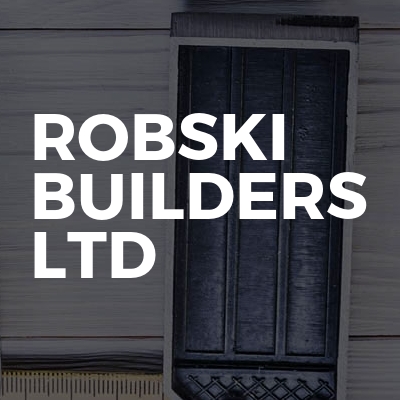Extension Builders in Teignmouth
Welcome to Torquay Builders Ltd, your go-to experts for all building and home improvement services in Torquay... read more »
Robski Builders Ltd: Your Trusted Building Experts in Shorton, Devon
Welcome to Robski Builders Ltd, your go-to... read more »
Welcome to JA Builders, the premier choice for building and landscaping services in Countess Wear and throughout Devon. Specialising in B... read more »
Welcome to Riviera Group Ltd, the premier choice for builders, extension builders, loft conversions, renovations, roofers, bathroom insta... read more »
Welcome to Joshua Frampton, your go-to experts for all building and renovation needs in Torquay and across Devon. As a leading business i... read more »
N.R Bricklaying Services is your go-to expert for all things bricklaying and building in the heart of Countess W... read more »
Kumiko (SW) Ltd is a distinguished building company based in the charming area of Lower Wear, offering a comprehensive r... read more »
Welcome to A R G Services, your trusted partner for a... read more »
Welcome to TQ Builders, your go-to experts for all bu... read more »
Perrin And Son Construction Ltd: Your Trusted... read more »
Welcome to Bevan Builders, your trusted partner for a... read more »
Phil Harrigan Construction: Your Go-To Builde... read more »
Welcome to DAB Bricklaying, your trusted partner for... read more »
Welcome to South Build, your trusted partner for all... read more »
Welcome to S&R Carpentry, your trusted Extension Buil... read more »
Welcome to Wilbuild, your trusted extension builders... read more »
Greg Building & Property Maintenance Services... read more »
Welcome to Morris Architectural Design, your trusted... read more »
Sharp Design And Build is your go-to... read more »
Search Extension Builders in places nearby
- Extension Builders in Exeter
- Extension Builders in Plymouth
- Extension Builders in Ashburton
- Extension Builders in Axminster
- Extension Builders in Barnstaple
- Extension Builders in Bideford
- Extension Builders in Buckfastleigh
- Extension Builders in Budleigh Salterton
- Extension Builders in Crediton
- Extension Builders in Dartmouth
- Extension Builders in Dawlish
- Extension Builders in Exmouth
- Extension Builders in Great Torrington
- Extension Builders in Higher Dunstone
- Extension Builders in Holsworthy
- Extension Builders in Honiton
- Extension Builders in Ilfracombe
- Extension Builders in Ivybridge
- Extension Builders in Kingsbridge
- Extension Builders in Lynton
- Extension Builders in Newton Abbot
- Extension Builders in Northam
- Extension Builders in Okehampton
- Extension Builders in Ottery St Mary
- Extension Builders in Paignton
- Extension Builders in Salcombe
- Extension Builders in Seaton
- Extension Builders in Sidmouth
- Extension Builders in South Molton
- Extension Builders in Tavistock
- Extension Builders in Tiverton
- Extension Builders in Torquay
- Extension Builders in Totnes
- Extension Builders in Wotton Cross
Understanding the Role of Extension Builders in Teignmouth
Teignmouth, a charming coastal town in Devon, is known for its picturesque landscapes and vibrant community. As the town grows, so does the need for home improvements and expansions. This is where extension builders in Teignmouth come into play. These professionals are skilled in transforming existing spaces into functional and aesthetically pleasing extensions, catering to the unique needs of homeowners.
The Importance of Home Extensions
Home extensions are more than just additional rooms; they are a way to enhance living spaces without the hassle of moving. In Teignmouth, where property prices can be steep, extending a home is often a more economical choice. Extensions can provide extra space for growing families, create a home office, or even add value to the property.
Benefits of Home Extensions
- Increased Living Space: Extensions provide more room for families to grow and thrive.
- Enhanced Property Value: A well-designed extension can significantly boost a home's market value.
- Customisation: Homeowners can tailor extensions to meet their specific needs and preferences.
- Cost-Effective: Compared to moving, extensions are often a more affordable option.
Types of Home Extensions
Extension builders in Teignmouth offer a variety of extension types, each suited to different needs and budgets. Understanding these options can help homeowners make informed decisions.
Single-Storey Extensions
Single-storey extensions are a popular choice for those looking to expand their ground floor. These extensions are ideal for creating larger kitchens, dining areas, or living rooms. They are generally less expensive and quicker to build compared to multi-storey extensions.
Double-Storey Extensions
For those needing more space, double-storey extensions provide additional rooms on both the ground and first floors. This type of extension is perfect for adding bedrooms or bathrooms and can significantly increase a home's value.
Wrap-Around Extensions
Wrap-around extensions combine side and rear extensions to create a large, open-plan space. This option is excellent for homeowners looking to maximise their living area and create a seamless flow between indoor and outdoor spaces.
Loft Conversions
Loft conversions are a clever way to utilise unused attic space. These extensions are perfect for creating additional bedrooms, home offices, or playrooms without altering the home's footprint.
Choosing the Right Extension Builder
Selecting the right extension builder in Teignmouth is crucial to the success of any home improvement project. Here are some factors to consider when making this important decision.
Experience and Expertise
Look for builders with a proven track record in home extensions. Experienced builders will have a portfolio of completed projects and can provide references from satisfied clients.
Local Knowledge
Builders familiar with Teignmouth will have a better understanding of local building regulations and environmental considerations. This knowledge can help streamline the planning and construction process.
Communication and Transparency
Effective communication is key to a successful project. Choose a builder who is open, transparent, and willing to discuss all aspects of the project, including costs, timelines, and potential challenges.
Quality of Workmanship
Inspect previous projects to assess the quality of workmanship. A reputable builder will use high-quality materials and adhere to industry standards to ensure a durable and attractive extension.
The Planning Process
Planning a home extension involves several steps, from initial design to final construction. Understanding this process can help homeowners prepare for their project and ensure a smooth experience.
Initial Consultation
The first step is to meet with an extension builder to discuss the project. This consultation will cover the homeowner's needs, budget, and design preferences.
Design and Planning
Once the initial consultation is complete, the builder will create a detailed design plan. This plan will include architectural drawings, material specifications, and a timeline for completion.
Obtaining Permits
Most home extensions require planning permission from the local council. The builder will handle this process, ensuring all necessary permits are obtained before construction begins.
Construction Phase
With permits in hand, construction can commence. The builder will manage all aspects of the build, from laying foundations to final finishes, ensuring the project stays on schedule and within budget.
Common Challenges and Solutions
While home extensions offer numerous benefits, they can also present challenges. Understanding these potential obstacles and their solutions can help homeowners navigate the process more smoothly.
Budget Constraints
Sticking to a budget is a common concern for homeowners. To avoid overspending, work closely with the builder to establish a realistic budget and monitor expenses throughout the project.
Planning Permission Delays
Obtaining planning permission can sometimes be a lengthy process. To minimise delays, ensure all necessary documentation is submitted promptly and accurately.
Unexpected Structural Issues
During construction, unforeseen structural issues may arise. A skilled builder will be able to address these challenges quickly and efficiently, minimising disruptions to the project.
Maintaining Quality and Safety
Ensuring quality and safety during a home extension project is paramount. Here are some tips to maintain high standards throughout the build.
Regular Inspections
Conduct regular inspections to ensure the work meets quality standards and complies with building regulations. This proactive approach can help identify and address issues early on.
Use of Quality Materials
Invest in high-quality materials to ensure the longevity and durability of the extension. While this may increase initial costs, it can save money on repairs and maintenance in the long run.
Hiring Qualified Professionals
Work with qualified professionals who have the necessary skills and experience to complete the project safely and efficiently. This includes architects, builders, and tradespeople.
Environmental Considerations
As environmental awareness grows, many homeowners are seeking sustainable building practices for their home extensions. Here are some ways to incorporate eco-friendly elements into a project.
Energy-Efficient Design
Design the extension with energy efficiency in mind. This can include installing double-glazed windows, using insulation materials, and incorporating passive solar design principles.
Use of Sustainable Materials
Choose sustainable materials, such as reclaimed wood or recycled metal, to reduce the environmental impact of the build. These materials are not only eco-friendly but also add unique character to the extension.
Incorporating Renewable Energy
Consider integrating renewable energy sources, such as solar panels or wind turbines, to power the extension. This can reduce energy costs and contribute to a greener future.
Frequently Asked Questions
- How long does a home extension take to complete? The timeline for a home extension varies depending on the size and complexity of the project. On average, it can take anywhere from three to six months.
- Do I need planning permission for a home extension in Teignmouth? Most extensions require planning permission, but some may fall under permitted development rights. It's best to consult with a local builder or the council for guidance.
- How much does a home extension cost in Teignmouth? Costs vary based on the type and size of the extension, as well as the materials used. On average, prices can range from £20,000 to £50,000 or more.
- Can I live in my home during the extension build? In most cases, homeowners can remain in their homes during construction, though there may be some disruptions. Discuss this with your builder to plan accordingly.
- What should I look for in an extension builder? Look for experience, local knowledge, quality workmanship, and good communication skills when choosing a builder.
- How can I ensure my extension is environmentally friendly? Incorporate energy-efficient designs, use sustainable materials, and consider renewable energy sources to create an eco-friendly extension.
In conclusion, extension builders in Teignmouth play a vital role in helping homeowners enhance their living spaces. By understanding the types of extensions available, choosing the right builder, and considering environmental factors, homeowners can create beautiful and functional spaces that meet their needs and add value to their properties.












